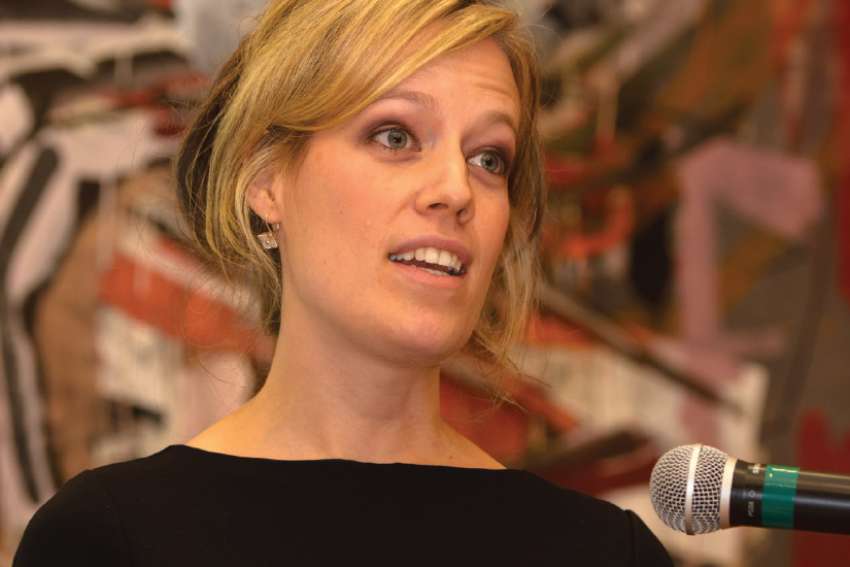Nursing professor Christina Lamb delivers the annual deVeber Lecture in Toronto Nov. 14.
Photo by Michael Swan
Ethical training for nurses in short supply, says bioethicist
By Michael Swan, The Catholic Register
Legalized euthanasia in Canada is putting nurses — and their consciences — in tough situations, said University of Alberta nursing professor Christina Lamb.
“A lot of nurses are switching their clinical areas or even leaving the profession,” said Lamb in a speech to a crowd that included medical professionals and students at the annual deVeber Lecture in Toronto Nov. 14.
Lamb is one of the few bioethicists who has studied conscientious objection and conscious objectors in depth since the law in Canada changed in 2016. Figuring out whether health systems can adapt when conscience prevents nurses from participating in so-called medical assistance in dying has to involve more than just surveys and raw numbers, Lamb said.
Lamb conducted in-depth interviews with eight Ontario nurses who objected to a procedure or a course of treatment on patients near the end of life (seven of the eight objected to euthanasia).
Their answers revealed a lot about the ethical training of nurses and the capacity of health systems to accommodate objections, said Lamb.
“This health care community is tearing apart a little bit,” she said.
Ethical decisions are not frills or rare occurrences for front-line nurses, yet the state of ethical training in most nursing programs is almost haphazard, according to Lamb.
She reached back to the origins of modern nursing to point out how central conscience is to the life and work of nurses.
“Nursing education has to be of a continuing, practical and especially moral nature,” Florence Nightingale wrote in Notes on Nursing: What Nursing Is, What Nursing is Not in 1859. In Nightingale’s day, most people thought of nurses as either drunks or prostitutes. No educated woman of standing in society was permitted to work outside the home.
If nurses today really are professionals, then they have a right to their own code of ethics which presumes they have a right to exercise their conscience, said Lamb.
For the most part, Lamb’s research has shown that hospitals, nursing homes and other employers have been able and willing to accommodate objecting nurses, but not all nurses are confident they will get that consideration. Lamb wants employers to be more forthcoming about how they will help nurses who object to any course of treatment on moral grounds.
“We need to create morally supportive environments,” she said.
As a bioethicist and nursing professor, Lamb encouraged any worried nurses in her audience to call her. “I will come talk to your managers,” she said.
Nurses today are under pressure, given the rising tide of demand for medically assisted suicide from Canada’s rapidly aging population of baby boomers, said second-year Ryerson nursing student Douglas Naus at the end of Lamb’s lecture.
“There’s definitely a fight now and more in the future,” he said.
Dr. Paul Zeni, a palliative care physician in Georgetown, Ont., was happy to get an overview of conscience rights from a non-doctor in health care.
“We all have a right to be conscientious objectors,” Zeni said. “We should have the support of whatever professional organization we’re in.”
Lamb is currently working with the Canadian Nurses Association on conscientious objection issues.
Please support The Catholic Register
Unlike many media companies, The Catholic Register has never charged readers for access to the news and information on our website. We want to keep our award-winning journalism as widely available as possible. But we need your help.
For more than 125 years, The Register has been a trusted source of faith-based journalism. By making even a small donation you help ensure our future as an important voice in the Catholic Church. If you support the mission of Catholic journalism, please donate today. Thank you.
DONATE

